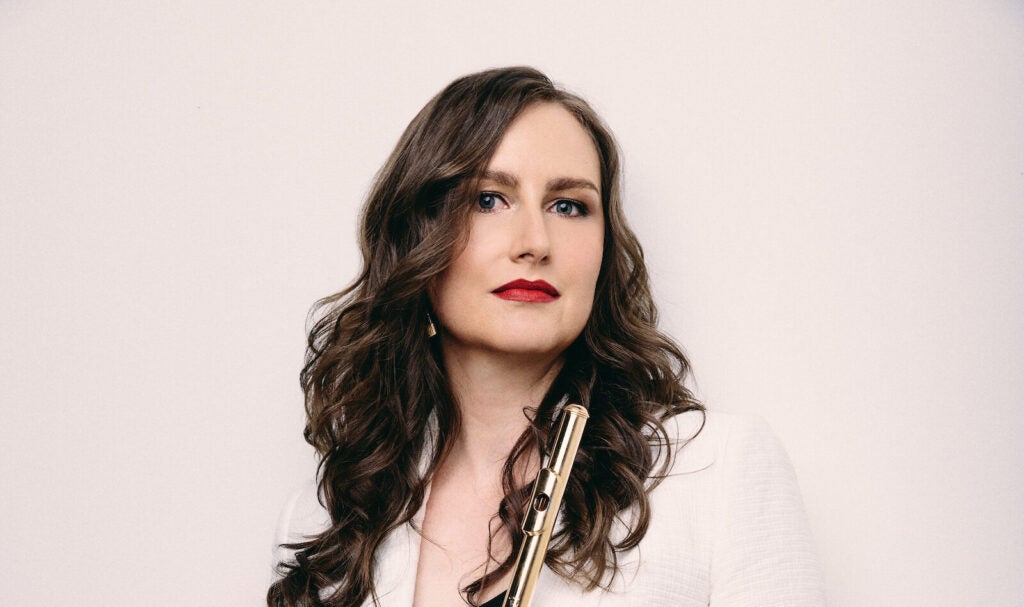Originally from Australia, Catherine Gregory is the new director of the UCLA Gluck Fellows Program which wrapped up its 2023-24 season with its annual showcase. Gregory, who performs internationally as a flute soloist and chamber musician, is also a lecturer in the School of Music’s music industry program.
Catherine first came to the United States on a Fulbright scholarship, studying at Carnegie Mellon University. After completing her artist diploma, Gregory was selected as the Flute Fellow of Ensemble Connect, which is a post-graduate program of the Juilliard School and Carnegie Hall. She later joined with musicians from the program to form the innovative ensemble Decoda, which combines virtuoso chamber music performance with impactful community engagement. She served for three years as the group’s co-artistic director, and recently led the effort to release Decoda’s debut album earlier this spring. Decoda is now the affiliate ensemble of Carnegie Hall.
Catherine talked to us about the mission of the Gluck Fellows and her plans for her directorship next season.
* * *
You were just named the director of the Gluck Program. Tell us about the UCLA Gluck Fellows Program.
The Gluck Program is designed to bring music into non-traditional spaces throughout the wider Los Angeles community. Our fellows bring music to libraries, hospitals, hospice centers, schools and more. It’s a wonderful opportunity for our students to develop their skills for communicating and connecting with audiences that might not have the opportunity to attend concerts.
Music students spend hours in the practice room working on their craft, but part of being a 21st century artist is also thinking about the audiences they encounter out in the real world. One of the things I love about the program is that it gives students during this formative time in their education and careers a chance to discover how music can be a vital source of inspiration in their communities. As Gluck Fellows, they are ambassadors not just for UCLA, but for the arts.
UCLA holds an annual Gluck Fellows showcase at the end of the academic year. How did the showcase go this year?
This year we had a traveling showcase. Rather than holding one concert at Schoenberg Hall we brought eight ensembles to two different elementary schools on their home turf. What we tried to do was transform the performance space of a school multipurpose hall. So, in the case of one space we created a “performance in the round.”
A performance in the round? What exactly is that?
We set up somewhat like the old Shakespearean theaters. We had different ensembles set up in different spaces around the audience. For example, the horn quartet made an unexpected entrance from the back of the hall. We really wanted to change up the space. It’s one of the tools that performers can use for audience engagement.
In this case, we had to develop these ideas right before the concert. I was really proud of the cohort this year. They had to figure things out on the fly, and did a brilliant job thrilling the audience. This flexibility is something that performers have to exercise all the time.
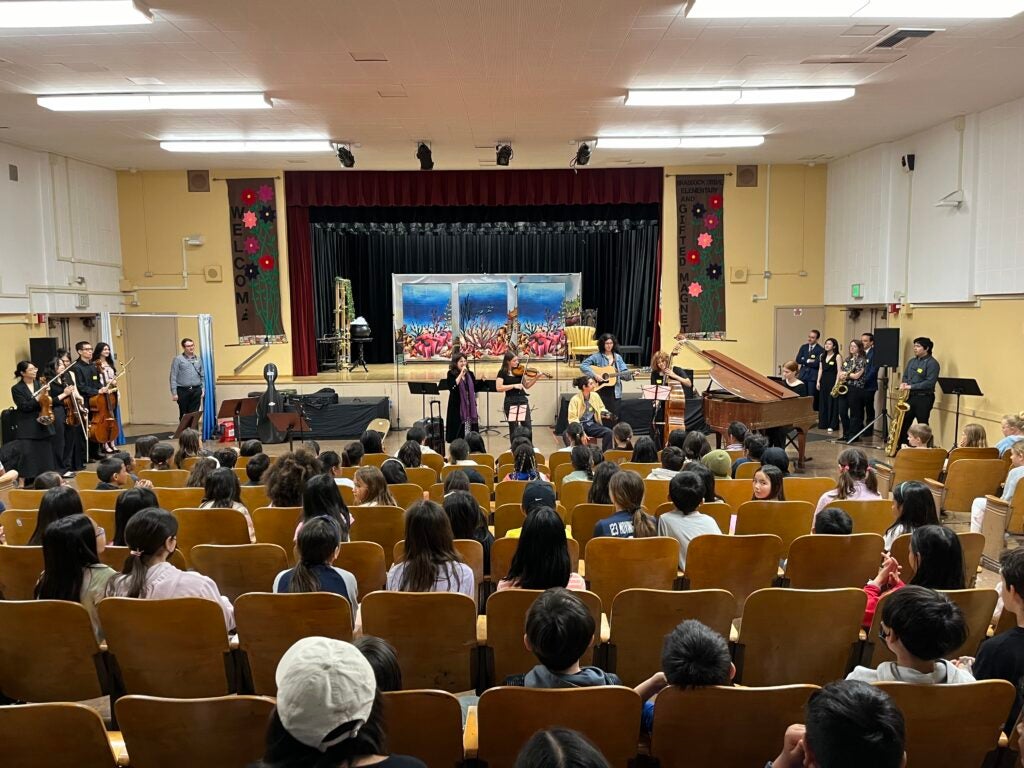
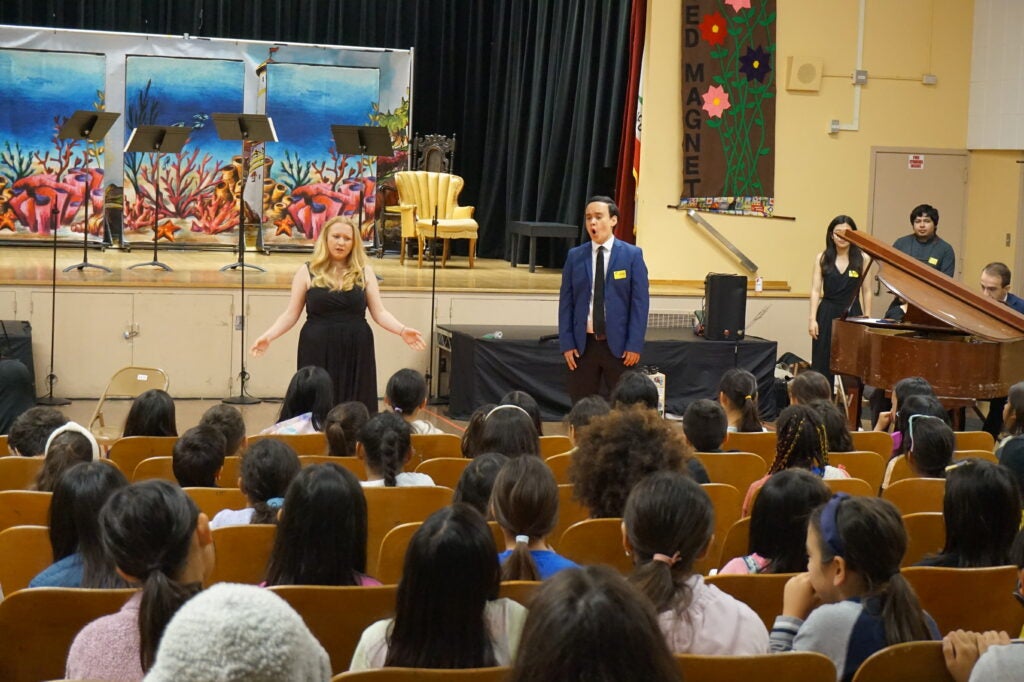
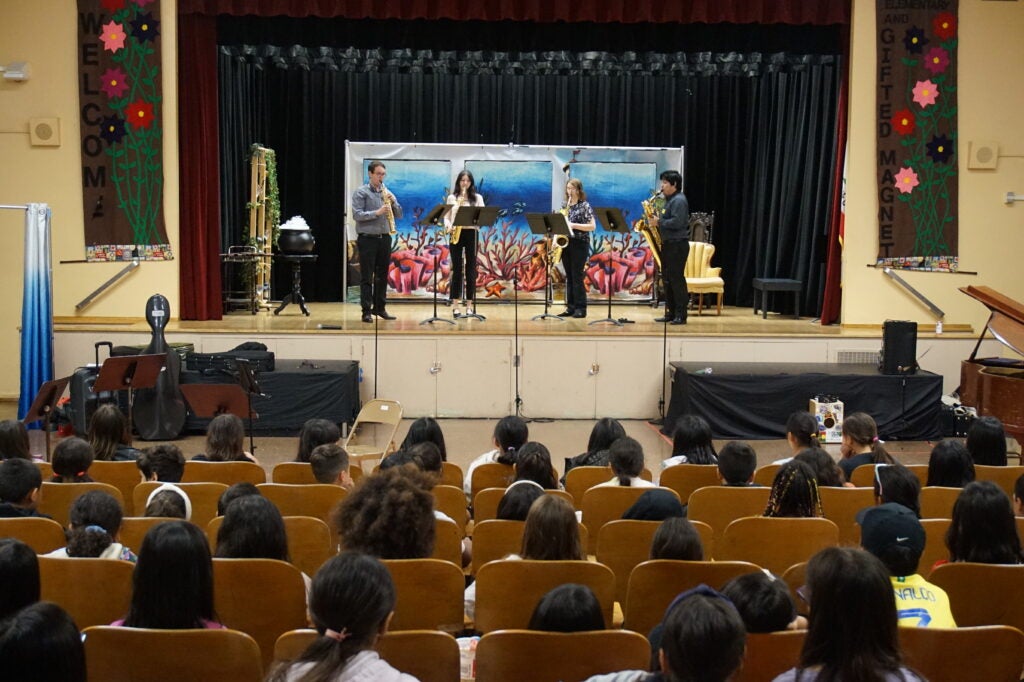
That sounds like an important skill to have—the ability to work through unexpected challenges.
It is. And it was amazing how well they worked together. I’m looking forward, next year, to starting early on to build a sense of community among the Gluck Fellows, helping them understand that they are part of something bigger.
What kind of plans do you have to build that sense of community among the Gluck Fellows?
We plan to kick off the year (Fall 2024) with a big gathering to introduce a new group of Fellows, and build some bridges between the ensembles so they can share experiences. I want to encourage the fellows to step outside their comfort zone to think creatively about how they can make engaging performances. A huge part of a performer’s life is understanding that audiences are different, and our job as performers is to set up the listening experience that will invite our audiences into this music which we love.
Earlier this spring, the Gluck Horn Quartet performed at an aged care facility. One of our community partners came up to me afterwards and said “see that gentleman in the back? He is never very interested in these events. But during today’s performance, he was making hand gestures, he was engaged.” It turns out that he was a former trombonist and had played with the LA Phil.” You never know when you are going to spark something.
You came to UCLA with a long history of community engagement and inventive programming, especially with your ensemble Decoda, based in New York. Tell us about Decoda.
We are a collective of musicians, we came through Ensemble Connect which is a postgraduate training program of Carnegie Hall and the Juilliard School. Ensemble Connect allowed us to have New York as our playground, artistically. We curated programs, created concerts, and learned how to operate as twenty-first century artists. A number of us just kept playing together, and we formed Decoda.
How did Decoda become the affiliate ensemble of Carnegie Hall?
That affiliation came as recognition of years of work in the field. The core of Decoda’s mission is to create a more compassionate and connected world through music. We place equal emphasis on creative excellence and community engagement.
Congratulations on releasing Decoda’s first CD.
Thank you.
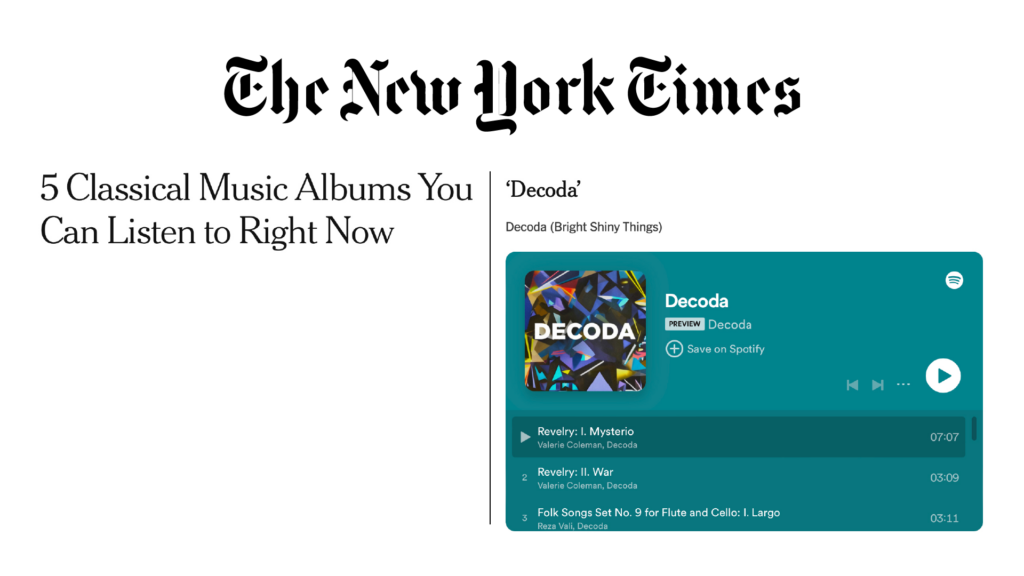
It’s received stellar reviews, including a nod from the New York Times which listed it as one of their featured albums in May. To what do you attribute its success?
The repertoire really shows the ensemble’s eclectic interests and versatility and I couldn’t be more proud that it features a new work from Valerie Coleman, which Carnegie Hall originally commissioned on our behalf in 2018.
When did you decide to record a CD?
You could say it has been ten years in the making for Decoda, but there is more to come! In fact, we recorded just last month a portrait concert of composer Xiao Bao He, who is currently incarcerated at Sing Sing Correctional Facility in New York. We believe that everyone has a right to their creativity, and that we should do what we can to bring music into dehumanized spaces.
Is it fair to say that your stance is that it is the artist’s responsibility to find audiences?
I would reframe that. I believe it is incumbent on artists to cultivate connection and community. One of the wonderful things about the Gluck Fellows Program is that music can happen anywhere: at a bedside, in a hospice facility, on the street, at the DMV, in a school, at a shelter for the unhoused. In my personal experience, some of the most powerful performances happen at nontraditional venues. Through their experiences in the Gluck Fellows Program, I hope that students will chart their own paths towards leading fulfilling and impactful artistic lives.
